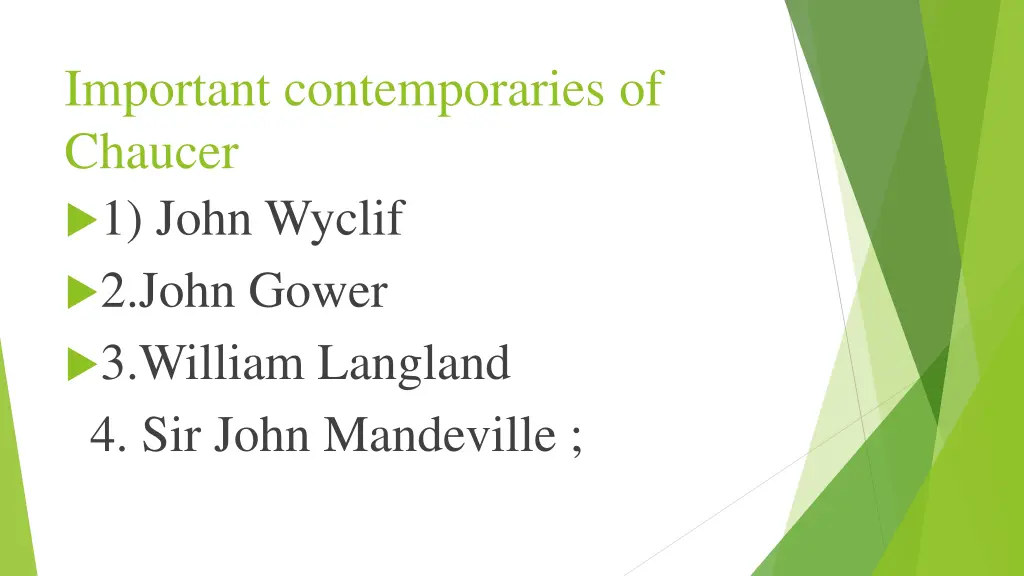
Important Contemporaries of Chaucer: John Wyclif, John Gower, William Langland, Sir John Mandeville
Explore the significant contemporaries of Chaucer including John Wyclif, a religious reformer and translator of the Bible; John Gower, a court poet known for his works like Confessio Amantis; William Langland, author of The Vision of William Concerning Piers the Plowman; and Sir John Mandeville, the supposed author of The Voyage and Travels of Sir John Mandeville. Learn about their contributions to literature and history during the 14th century.
Uploaded on | 0 Views
Download Presentation

Please find below an Image/Link to download the presentation.
The content on the website is provided AS IS for your information and personal use only. It may not be sold, licensed, or shared on other websites without obtaining consent from the author. If you encounter any issues during the download, it is possible that the publisher has removed the file from their server.
You are allowed to download the files provided on this website for personal or commercial use, subject to the condition that they are used lawfully. All files are the property of their respective owners.
The content on the website is provided AS IS for your information and personal use only. It may not be sold, licensed, or shared on other websites without obtaining consent from the author.
E N D
Presentation Transcript
Important contemporaries of Chaucer 1) John Wyclif 2.John Gower 3.William Langland 4. Sir John Mandeville ;
John Wycliffe John Wyclif was a religious reformer and a translator of the Bible. He was a popular teacher at Oxford and Master of Balliol College, Oxford. He was against the ecclesiastical court. He is popularly known as the founder of English prose and as the real originator of European Protestantism.
Throughout his writings Wyclif appeals to Scripture as the primary and supreme authority in all matters of controversy, insisting that the power of Pope is simply ministerial He censures the corruption of the lawyers, and defends the concept of socialism. He has Star of the Reformation." rightly been called Morning star of Reformation.
John Gower One of the major court poets of the 14th century.Chaucer dedicates his Troilus and Criseyde to him. His best known works are : Confessio Amantis and Vox Clamantis. The latter is a dream allegory in which the poet symbolically presents the Peasants Revolt of 1381. It influenced Ruskin..
Confessio Amantis is a poem of eight books which satirises the corruption of the Church. It is written in short octosyllabic couplets.
The poetry of Gower is remarkable for its pleasant melody and good craftsmanship. But Gower lacks imagination. He also lacked Chaucer's humour and his narrative and dramatic powers. Gower is more of a moralist.
William Langland His best known work is The Vision of William Concerning Piers the plowman, The poem is a satire on the contemporary Church. It has been called the greatest book of social protest in the fourteenth century. Langland's poetry is alliterative. It is allegorical in nature.
John Mandeville Sir John Mandeville is the supposed author of The Voyage and Travels of Sir John Mandeville, Knight., a travel memoir which first circulated between 1357 and 1371. It is one of the most famous and widely read travel romances of Europe. .
Originally written in Norman French about 1360 and translated into 10 major European languages, including English and Latin, by the end of the century, the Travels enjoyed undiminished popularity for over 400 years. Purporting to be a travel guide emphasizing the exotic wonders of the Near and Far East, it is generally considered one of the finest works of imaginative literature of the medieval period
